Group Case Study: HI6027 Business and Corporate Law Assessment
VerifiedAdded on 2022/08/24
|11
|2464
|20
Case Study
AI Summary
This case study assignment for HI6027, Business and Corporate Law, presents two distinct scenarios requiring legal analysis. Part A addresses a situation where a conman defrauds a museum, prompting an examination of deceptive conduct under the Competition and Consumer Act 2010, referencing key cases like Forwood Products Pty Ltd v Gibbett and ACCC v Telstra Corporation Ltd to determine the museum's legal recourse. Part B focuses on pre-registration contracts, analyzing the accountability of individuals (Kellie) who establish contracts for a company before its registration, and the implications of ratification under the Corporations Act 2001, citing cases like Kelner v Baxter and Aztech Science v Atlanta Aerospace. The assignment requires critical application of legal principles to determine liabilities and obligations in both scenarios, providing a comprehensive understanding of business and corporate law principles.

Running head: HI6027
HI6027
Name of the Student
Name of the University
Author Note
HI6027
Name of the Student
Name of the University
Author Note
Paraphrase This Document
Need a fresh take? Get an instant paraphrase of this document with our AI Paraphraser
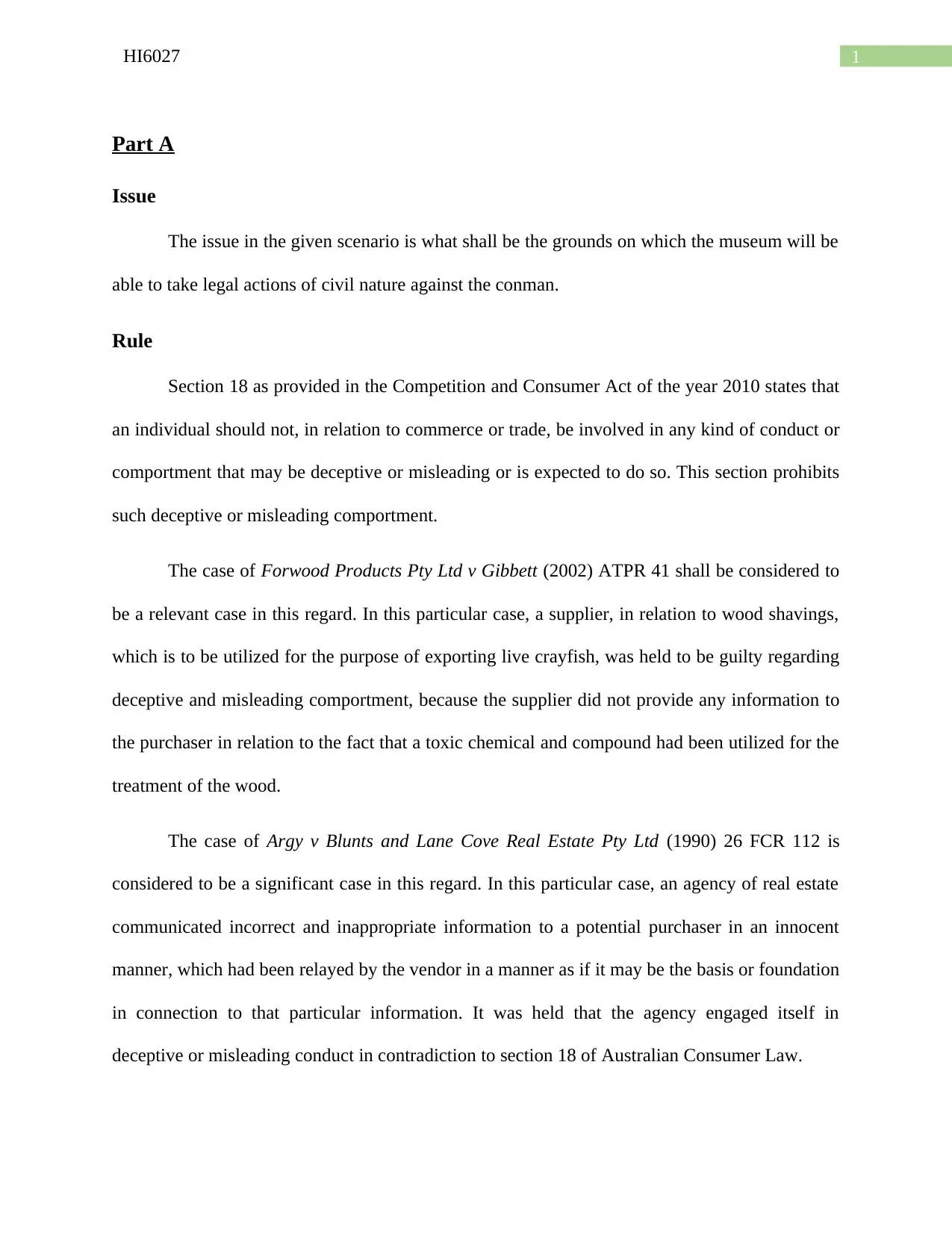
1HI6027
Part A
Issue
The issue in the given scenario is what shall be the grounds on which the museum will be
able to take legal actions of civil nature against the conman.
Rule
Section 18 as provided in the Competition and Consumer Act of the year 2010 states that
an individual should not, in relation to commerce or trade, be involved in any kind of conduct or
comportment that may be deceptive or misleading or is expected to do so. This section prohibits
such deceptive or misleading comportment.
The case of Forwood Products Pty Ltd v Gibbett (2002) ATPR 41 shall be considered to
be a relevant case in this regard. In this particular case, a supplier, in relation to wood shavings,
which is to be utilized for the purpose of exporting live crayfish, was held to be guilty regarding
deceptive and misleading comportment, because the supplier did not provide any information to
the purchaser in relation to the fact that a toxic chemical and compound had been utilized for the
treatment of the wood.
The case of Argy v Blunts and Lane Cove Real Estate Pty Ltd (1990) 26 FCR 112 is
considered to be a significant case in this regard. In this particular case, an agency of real estate
communicated incorrect and inappropriate information to a potential purchaser in an innocent
manner, which had been relayed by the vendor in a manner as if it may be the basis or foundation
in connection to that particular information. It was held that the agency engaged itself in
deceptive or misleading conduct in contradiction to section 18 of Australian Consumer Law.
Part A
Issue
The issue in the given scenario is what shall be the grounds on which the museum will be
able to take legal actions of civil nature against the conman.
Rule
Section 18 as provided in the Competition and Consumer Act of the year 2010 states that
an individual should not, in relation to commerce or trade, be involved in any kind of conduct or
comportment that may be deceptive or misleading or is expected to do so. This section prohibits
such deceptive or misleading comportment.
The case of Forwood Products Pty Ltd v Gibbett (2002) ATPR 41 shall be considered to
be a relevant case in this regard. In this particular case, a supplier, in relation to wood shavings,
which is to be utilized for the purpose of exporting live crayfish, was held to be guilty regarding
deceptive and misleading comportment, because the supplier did not provide any information to
the purchaser in relation to the fact that a toxic chemical and compound had been utilized for the
treatment of the wood.
The case of Argy v Blunts and Lane Cove Real Estate Pty Ltd (1990) 26 FCR 112 is
considered to be a significant case in this regard. In this particular case, an agency of real estate
communicated incorrect and inappropriate information to a potential purchaser in an innocent
manner, which had been relayed by the vendor in a manner as if it may be the basis or foundation
in connection to that particular information. It was held that the agency engaged itself in
deceptive or misleading conduct in contradiction to section 18 of Australian Consumer Law.
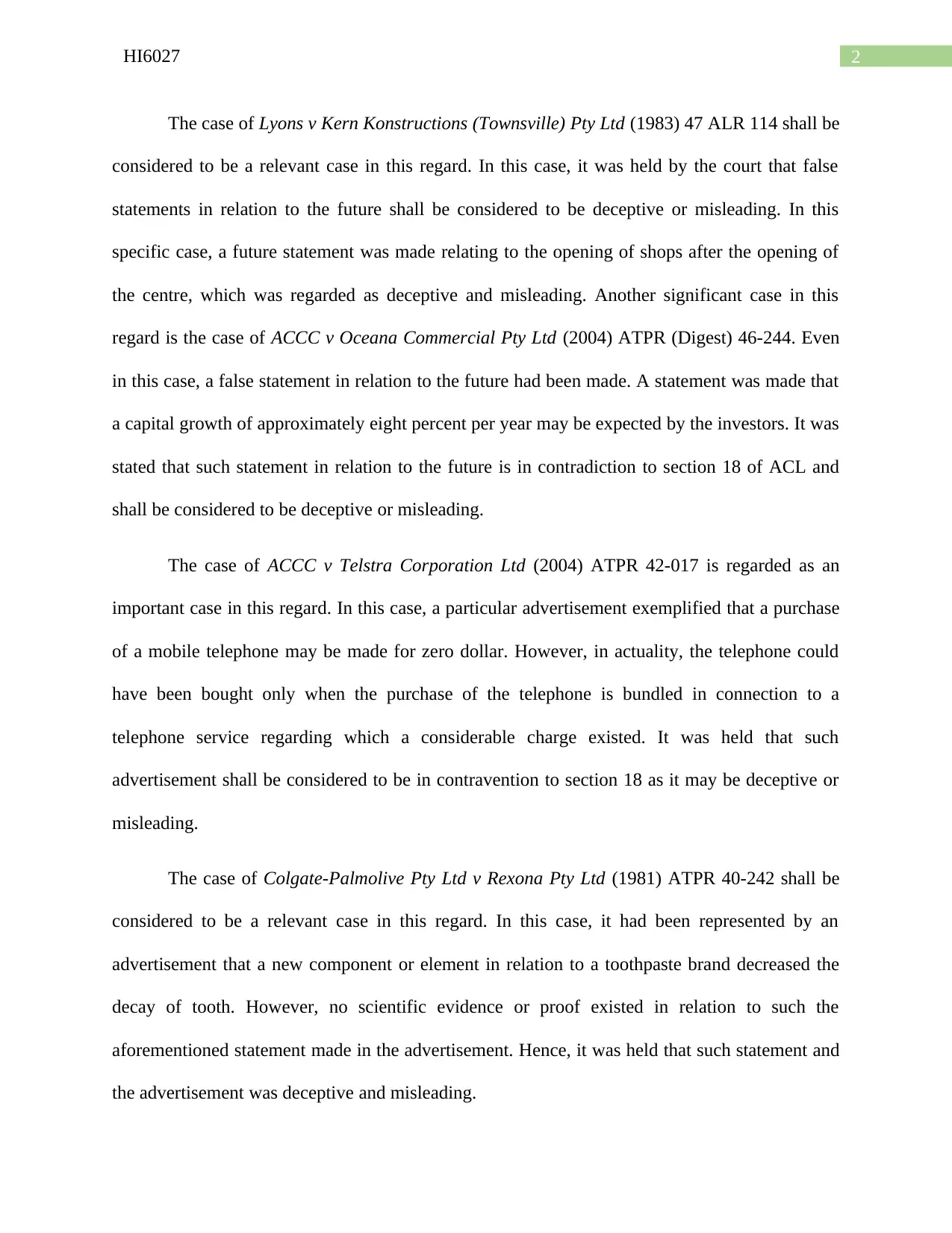
2HI6027
The case of Lyons v Kern Konstructions (Townsville) Pty Ltd (1983) 47 ALR 114 shall be
considered to be a relevant case in this regard. In this case, it was held by the court that false
statements in relation to the future shall be considered to be deceptive or misleading. In this
specific case, a future statement was made relating to the opening of shops after the opening of
the centre, which was regarded as deceptive and misleading. Another significant case in this
regard is the case of ACCC v Oceana Commercial Pty Ltd (2004) ATPR (Digest) 46-244. Even
in this case, a false statement in relation to the future had been made. A statement was made that
a capital growth of approximately eight percent per year may be expected by the investors. It was
stated that such statement in relation to the future is in contradiction to section 18 of ACL and
shall be considered to be deceptive or misleading.
The case of ACCC v Telstra Corporation Ltd (2004) ATPR 42-017 is regarded as an
important case in this regard. In this case, a particular advertisement exemplified that a purchase
of a mobile telephone may be made for zero dollar. However, in actuality, the telephone could
have been bought only when the purchase of the telephone is bundled in connection to a
telephone service regarding which a considerable charge existed. It was held that such
advertisement shall be considered to be in contravention to section 18 as it may be deceptive or
misleading.
The case of Colgate-Palmolive Pty Ltd v Rexona Pty Ltd (1981) ATPR 40-242 shall be
considered to be a relevant case in this regard. In this case, it had been represented by an
advertisement that a new component or element in relation to a toothpaste brand decreased the
decay of tooth. However, no scientific evidence or proof existed in relation to such the
aforementioned statement made in the advertisement. Hence, it was held that such statement and
the advertisement was deceptive and misleading.
The case of Lyons v Kern Konstructions (Townsville) Pty Ltd (1983) 47 ALR 114 shall be
considered to be a relevant case in this regard. In this case, it was held by the court that false
statements in relation to the future shall be considered to be deceptive or misleading. In this
specific case, a future statement was made relating to the opening of shops after the opening of
the centre, which was regarded as deceptive and misleading. Another significant case in this
regard is the case of ACCC v Oceana Commercial Pty Ltd (2004) ATPR (Digest) 46-244. Even
in this case, a false statement in relation to the future had been made. A statement was made that
a capital growth of approximately eight percent per year may be expected by the investors. It was
stated that such statement in relation to the future is in contradiction to section 18 of ACL and
shall be considered to be deceptive or misleading.
The case of ACCC v Telstra Corporation Ltd (2004) ATPR 42-017 is regarded as an
important case in this regard. In this case, a particular advertisement exemplified that a purchase
of a mobile telephone may be made for zero dollar. However, in actuality, the telephone could
have been bought only when the purchase of the telephone is bundled in connection to a
telephone service regarding which a considerable charge existed. It was held that such
advertisement shall be considered to be in contravention to section 18 as it may be deceptive or
misleading.
The case of Colgate-Palmolive Pty Ltd v Rexona Pty Ltd (1981) ATPR 40-242 shall be
considered to be a relevant case in this regard. In this case, it had been represented by an
advertisement that a new component or element in relation to a toothpaste brand decreased the
decay of tooth. However, no scientific evidence or proof existed in relation to such the
aforementioned statement made in the advertisement. Hence, it was held that such statement and
the advertisement was deceptive and misleading.
⊘ This is a preview!⊘
Do you want full access?
Subscribe today to unlock all pages.

Trusted by 1+ million students worldwide
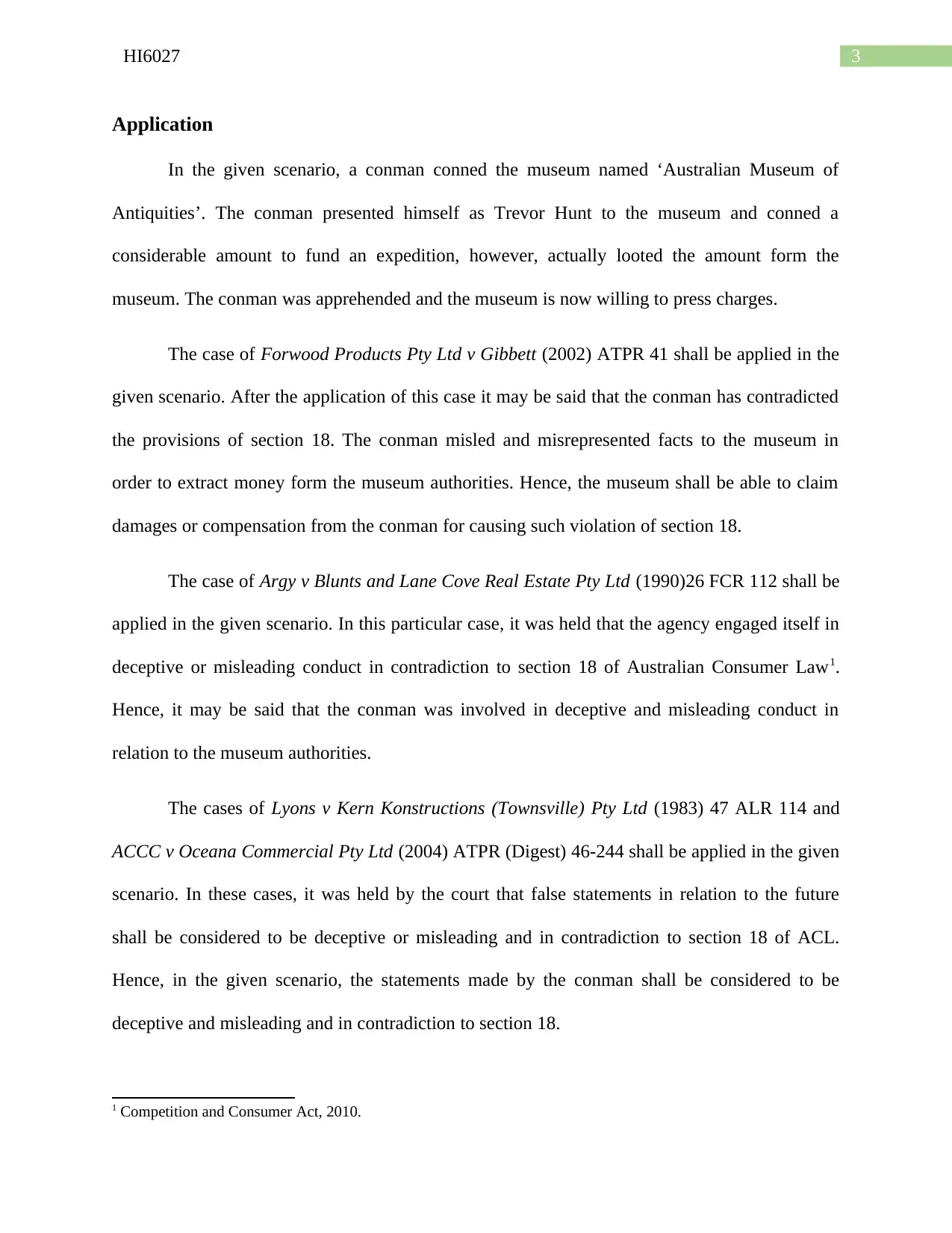
3HI6027
Application
In the given scenario, a conman conned the museum named ‘Australian Museum of
Antiquities’. The conman presented himself as Trevor Hunt to the museum and conned a
considerable amount to fund an expedition, however, actually looted the amount form the
museum. The conman was apprehended and the museum is now willing to press charges.
The case of Forwood Products Pty Ltd v Gibbett (2002) ATPR 41 shall be applied in the
given scenario. After the application of this case it may be said that the conman has contradicted
the provisions of section 18. The conman misled and misrepresented facts to the museum in
order to extract money form the museum authorities. Hence, the museum shall be able to claim
damages or compensation from the conman for causing such violation of section 18.
The case of Argy v Blunts and Lane Cove Real Estate Pty Ltd (1990)26 FCR 112 shall be
applied in the given scenario. In this particular case, it was held that the agency engaged itself in
deceptive or misleading conduct in contradiction to section 18 of Australian Consumer Law1.
Hence, it may be said that the conman was involved in deceptive and misleading conduct in
relation to the museum authorities.
The cases of Lyons v Kern Konstructions (Townsville) Pty Ltd (1983) 47 ALR 114 and
ACCC v Oceana Commercial Pty Ltd (2004) ATPR (Digest) 46-244 shall be applied in the given
scenario. In these cases, it was held by the court that false statements in relation to the future
shall be considered to be deceptive or misleading and in contradiction to section 18 of ACL.
Hence, in the given scenario, the statements made by the conman shall be considered to be
deceptive and misleading and in contradiction to section 18.
1 Competition and Consumer Act, 2010.
Application
In the given scenario, a conman conned the museum named ‘Australian Museum of
Antiquities’. The conman presented himself as Trevor Hunt to the museum and conned a
considerable amount to fund an expedition, however, actually looted the amount form the
museum. The conman was apprehended and the museum is now willing to press charges.
The case of Forwood Products Pty Ltd v Gibbett (2002) ATPR 41 shall be applied in the
given scenario. After the application of this case it may be said that the conman has contradicted
the provisions of section 18. The conman misled and misrepresented facts to the museum in
order to extract money form the museum authorities. Hence, the museum shall be able to claim
damages or compensation from the conman for causing such violation of section 18.
The case of Argy v Blunts and Lane Cove Real Estate Pty Ltd (1990)26 FCR 112 shall be
applied in the given scenario. In this particular case, it was held that the agency engaged itself in
deceptive or misleading conduct in contradiction to section 18 of Australian Consumer Law1.
Hence, it may be said that the conman was involved in deceptive and misleading conduct in
relation to the museum authorities.
The cases of Lyons v Kern Konstructions (Townsville) Pty Ltd (1983) 47 ALR 114 and
ACCC v Oceana Commercial Pty Ltd (2004) ATPR (Digest) 46-244 shall be applied in the given
scenario. In these cases, it was held by the court that false statements in relation to the future
shall be considered to be deceptive or misleading and in contradiction to section 18 of ACL.
Hence, in the given scenario, the statements made by the conman shall be considered to be
deceptive and misleading and in contradiction to section 18.
1 Competition and Consumer Act, 2010.
Paraphrase This Document
Need a fresh take? Get an instant paraphrase of this document with our AI Paraphraser
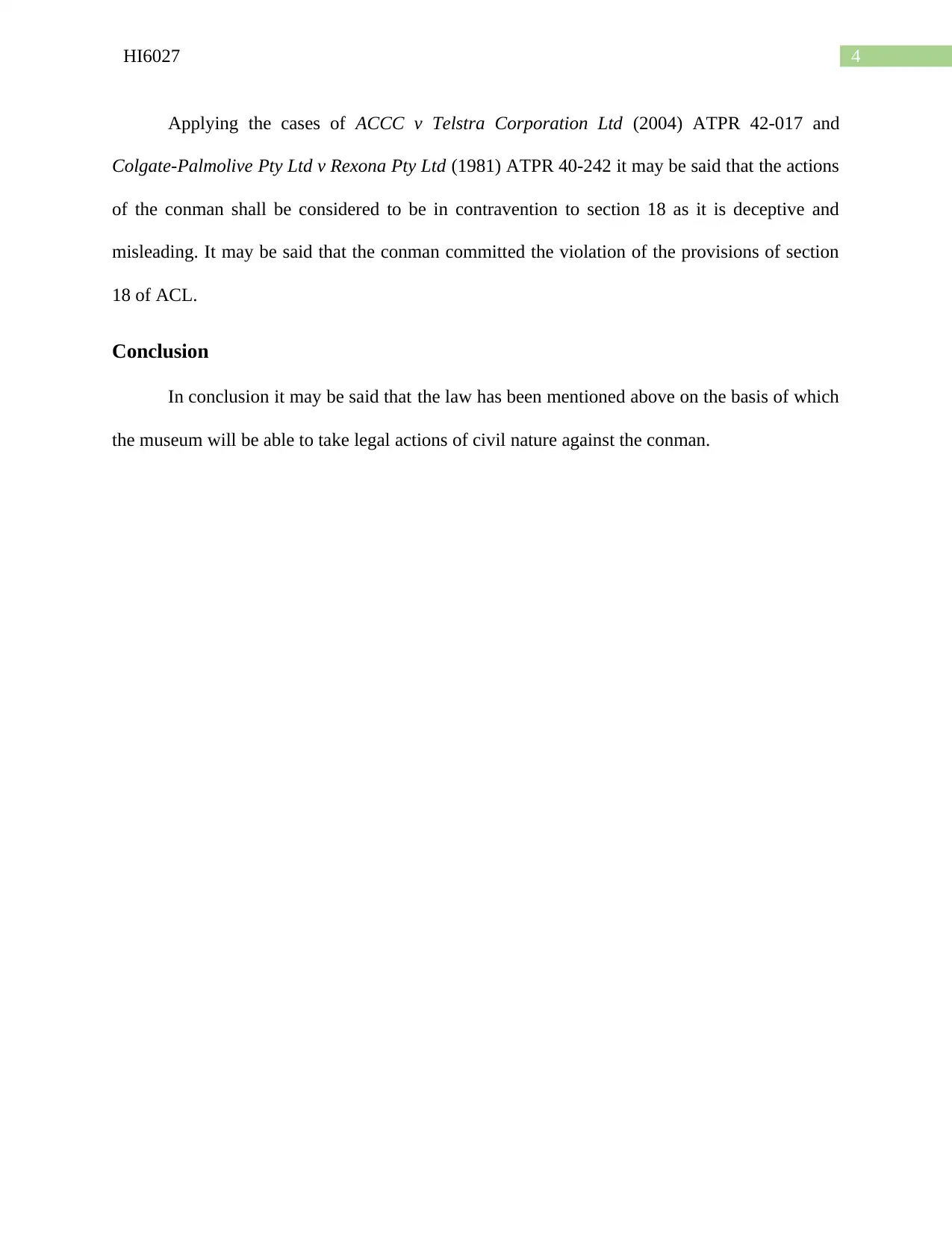
4HI6027
Applying the cases of ACCC v Telstra Corporation Ltd (2004) ATPR 42-017 and
Colgate-Palmolive Pty Ltd v Rexona Pty Ltd (1981) ATPR 40-242 it may be said that the actions
of the conman shall be considered to be in contravention to section 18 as it is deceptive and
misleading. It may be said that the conman committed the violation of the provisions of section
18 of ACL.
Conclusion
In conclusion it may be said that the law has been mentioned above on the basis of which
the museum will be able to take legal actions of civil nature against the conman.
Applying the cases of ACCC v Telstra Corporation Ltd (2004) ATPR 42-017 and
Colgate-Palmolive Pty Ltd v Rexona Pty Ltd (1981) ATPR 40-242 it may be said that the actions
of the conman shall be considered to be in contravention to section 18 as it is deceptive and
misleading. It may be said that the conman committed the violation of the provisions of section
18 of ACL.
Conclusion
In conclusion it may be said that the law has been mentioned above on the basis of which
the museum will be able to take legal actions of civil nature against the conman.
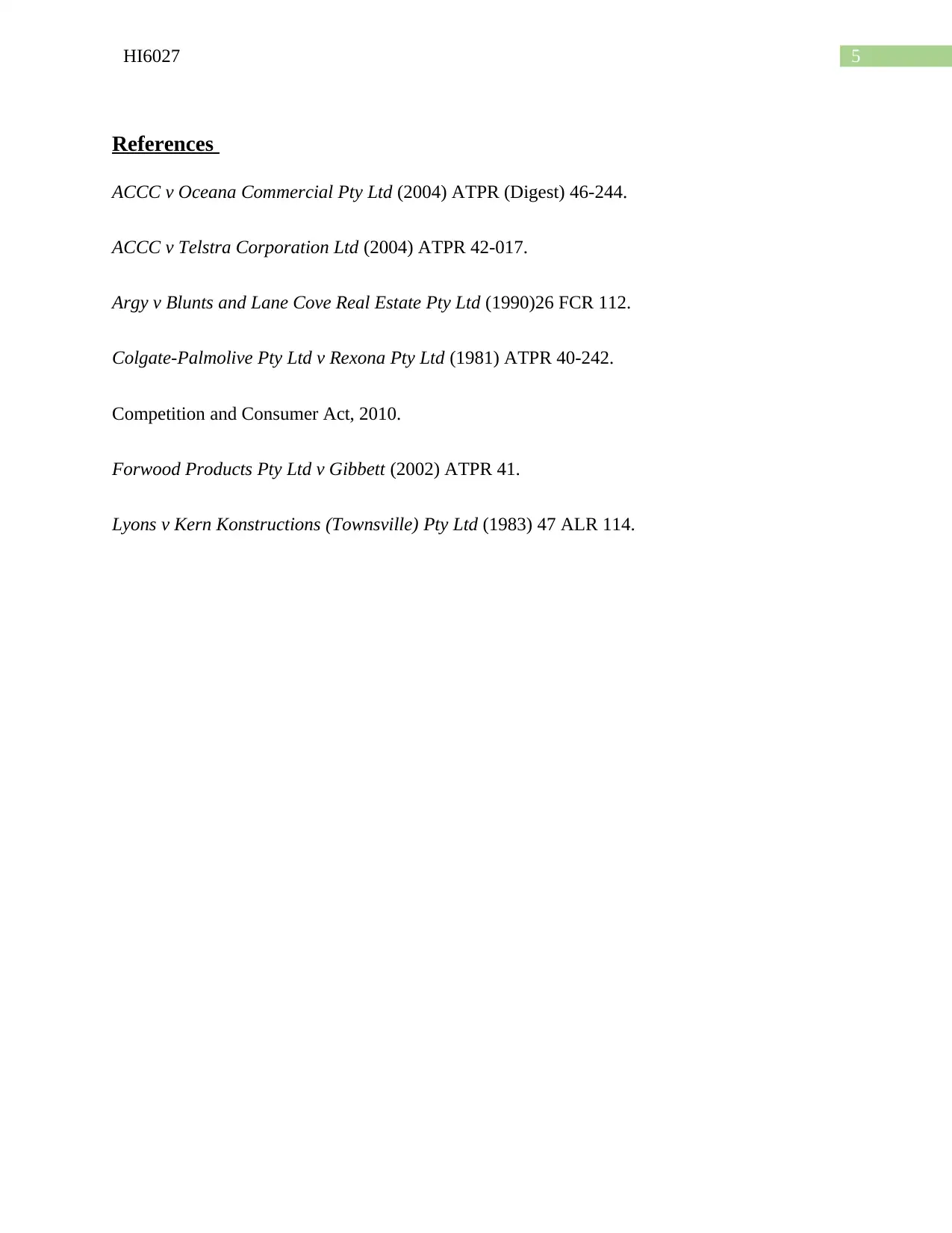
5HI6027
References
ACCC v Oceana Commercial Pty Ltd (2004) ATPR (Digest) 46-244.
ACCC v Telstra Corporation Ltd (2004) ATPR 42-017.
Argy v Blunts and Lane Cove Real Estate Pty Ltd (1990)26 FCR 112.
Colgate-Palmolive Pty Ltd v Rexona Pty Ltd (1981) ATPR 40-242.
Competition and Consumer Act, 2010.
Forwood Products Pty Ltd v Gibbett (2002) ATPR 41.
Lyons v Kern Konstructions (Townsville) Pty Ltd (1983) 47 ALR 114.
References
ACCC v Oceana Commercial Pty Ltd (2004) ATPR (Digest) 46-244.
ACCC v Telstra Corporation Ltd (2004) ATPR 42-017.
Argy v Blunts and Lane Cove Real Estate Pty Ltd (1990)26 FCR 112.
Colgate-Palmolive Pty Ltd v Rexona Pty Ltd (1981) ATPR 40-242.
Competition and Consumer Act, 2010.
Forwood Products Pty Ltd v Gibbett (2002) ATPR 41.
Lyons v Kern Konstructions (Townsville) Pty Ltd (1983) 47 ALR 114.
⊘ This is a preview!⊘
Do you want full access?
Subscribe today to unlock all pages.

Trusted by 1+ million students worldwide
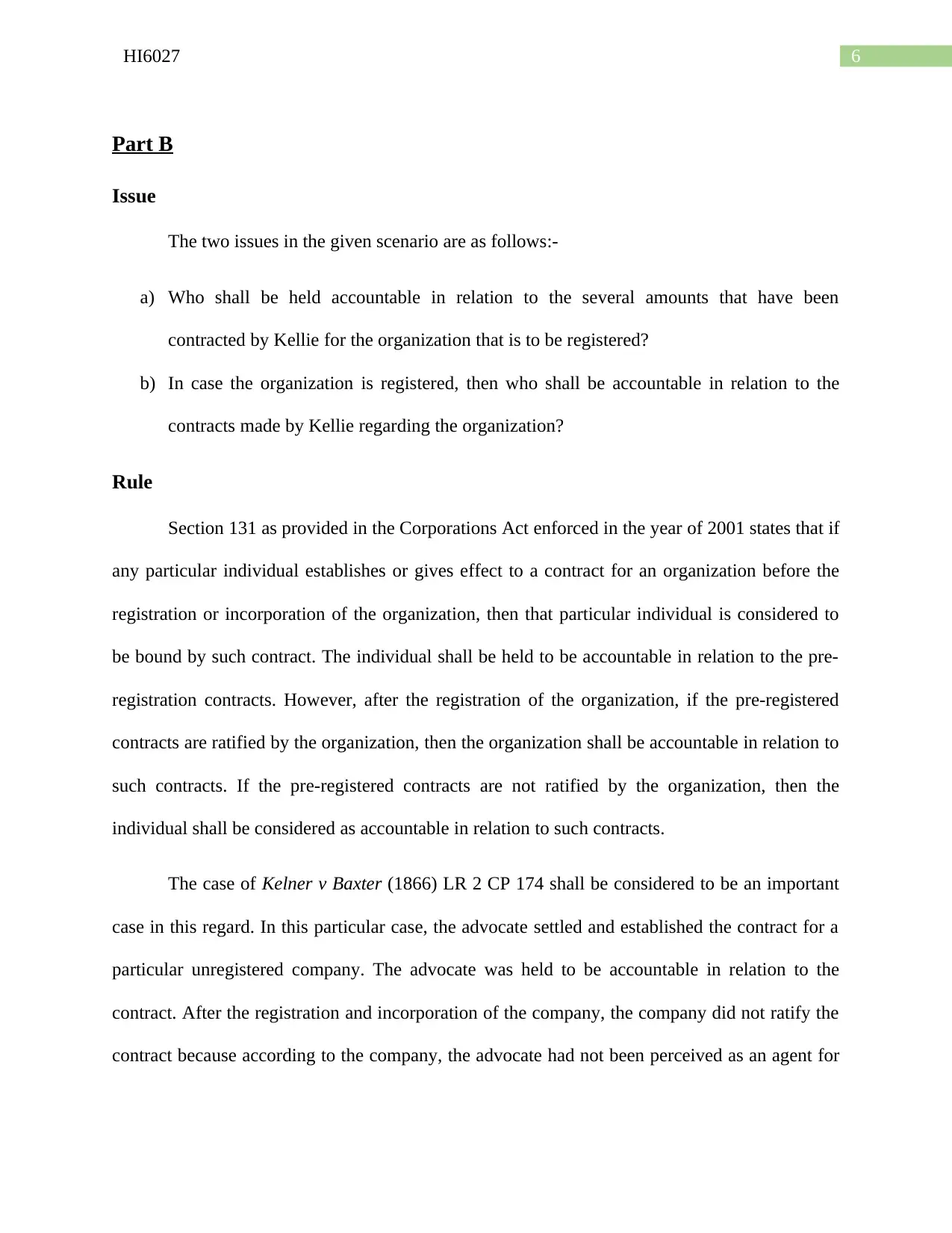
6HI6027
Part B
Issue
The two issues in the given scenario are as follows:-
a) Who shall be held accountable in relation to the several amounts that have been
contracted by Kellie for the organization that is to be registered?
b) In case the organization is registered, then who shall be accountable in relation to the
contracts made by Kellie regarding the organization?
Rule
Section 131 as provided in the Corporations Act enforced in the year of 2001 states that if
any particular individual establishes or gives effect to a contract for an organization before the
registration or incorporation of the organization, then that particular individual is considered to
be bound by such contract. The individual shall be held to be accountable in relation to the pre-
registration contracts. However, after the registration of the organization, if the pre-registered
contracts are ratified by the organization, then the organization shall be accountable in relation to
such contracts. If the pre-registered contracts are not ratified by the organization, then the
individual shall be considered as accountable in relation to such contracts.
The case of Kelner v Baxter (1866) LR 2 CP 174 shall be considered to be an important
case in this regard. In this particular case, the advocate settled and established the contract for a
particular unregistered company. The advocate was held to be accountable in relation to the
contract. After the registration and incorporation of the company, the company did not ratify the
contract because according to the company, the advocate had not been perceived as an agent for
Part B
Issue
The two issues in the given scenario are as follows:-
a) Who shall be held accountable in relation to the several amounts that have been
contracted by Kellie for the organization that is to be registered?
b) In case the organization is registered, then who shall be accountable in relation to the
contracts made by Kellie regarding the organization?
Rule
Section 131 as provided in the Corporations Act enforced in the year of 2001 states that if
any particular individual establishes or gives effect to a contract for an organization before the
registration or incorporation of the organization, then that particular individual is considered to
be bound by such contract. The individual shall be held to be accountable in relation to the pre-
registration contracts. However, after the registration of the organization, if the pre-registered
contracts are ratified by the organization, then the organization shall be accountable in relation to
such contracts. If the pre-registered contracts are not ratified by the organization, then the
individual shall be considered as accountable in relation to such contracts.
The case of Kelner v Baxter (1866) LR 2 CP 174 shall be considered to be an important
case in this regard. In this particular case, the advocate settled and established the contract for a
particular unregistered company. The advocate was held to be accountable in relation to the
contract. After the registration and incorporation of the company, the company did not ratify the
contract because according to the company, the advocate had not been perceived as an agent for
Paraphrase This Document
Need a fresh take? Get an instant paraphrase of this document with our AI Paraphraser
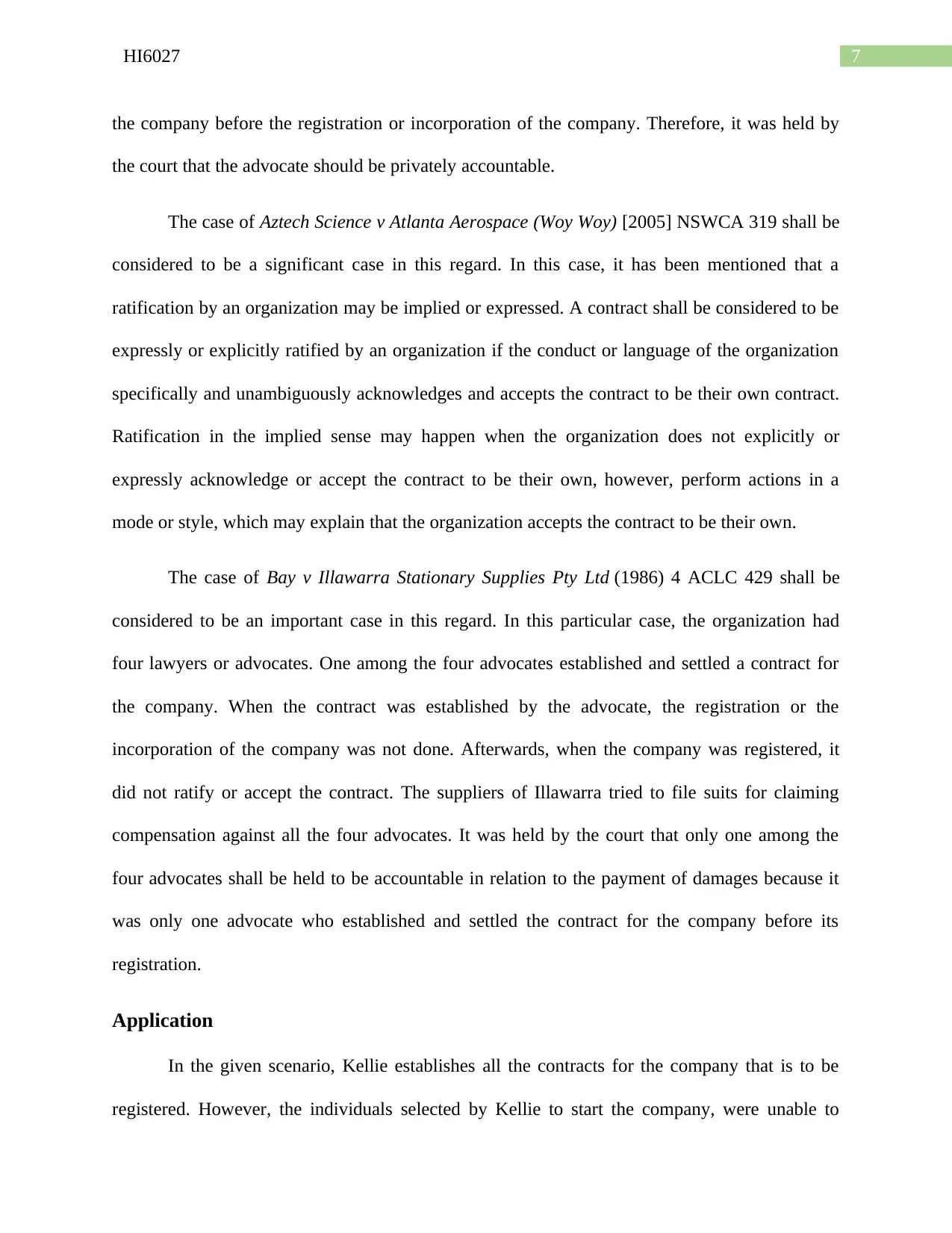
7HI6027
the company before the registration or incorporation of the company. Therefore, it was held by
the court that the advocate should be privately accountable.
The case of Aztech Science v Atlanta Aerospace (Woy Woy) [2005] NSWCA 319 shall be
considered to be a significant case in this regard. In this case, it has been mentioned that a
ratification by an organization may be implied or expressed. A contract shall be considered to be
expressly or explicitly ratified by an organization if the conduct or language of the organization
specifically and unambiguously acknowledges and accepts the contract to be their own contract.
Ratification in the implied sense may happen when the organization does not explicitly or
expressly acknowledge or accept the contract to be their own, however, perform actions in a
mode or style, which may explain that the organization accepts the contract to be their own.
The case of Bay v Illawarra Stationary Supplies Pty Ltd (1986) 4 ACLC 429 shall be
considered to be an important case in this regard. In this particular case, the organization had
four lawyers or advocates. One among the four advocates established and settled a contract for
the company. When the contract was established by the advocate, the registration or the
incorporation of the company was not done. Afterwards, when the company was registered, it
did not ratify or accept the contract. The suppliers of Illawarra tried to file suits for claiming
compensation against all the four advocates. It was held by the court that only one among the
four advocates shall be held to be accountable in relation to the payment of damages because it
was only one advocate who established and settled the contract for the company before its
registration.
Application
In the given scenario, Kellie establishes all the contracts for the company that is to be
registered. However, the individuals selected by Kellie to start the company, were unable to
the company before the registration or incorporation of the company. Therefore, it was held by
the court that the advocate should be privately accountable.
The case of Aztech Science v Atlanta Aerospace (Woy Woy) [2005] NSWCA 319 shall be
considered to be a significant case in this regard. In this case, it has been mentioned that a
ratification by an organization may be implied or expressed. A contract shall be considered to be
expressly or explicitly ratified by an organization if the conduct or language of the organization
specifically and unambiguously acknowledges and accepts the contract to be their own contract.
Ratification in the implied sense may happen when the organization does not explicitly or
expressly acknowledge or accept the contract to be their own, however, perform actions in a
mode or style, which may explain that the organization accepts the contract to be their own.
The case of Bay v Illawarra Stationary Supplies Pty Ltd (1986) 4 ACLC 429 shall be
considered to be an important case in this regard. In this particular case, the organization had
four lawyers or advocates. One among the four advocates established and settled a contract for
the company. When the contract was established by the advocate, the registration or the
incorporation of the company was not done. Afterwards, when the company was registered, it
did not ratify or accept the contract. The suppliers of Illawarra tried to file suits for claiming
compensation against all the four advocates. It was held by the court that only one among the
four advocates shall be held to be accountable in relation to the payment of damages because it
was only one advocate who established and settled the contract for the company before its
registration.
Application
In the given scenario, Kellie establishes all the contracts for the company that is to be
registered. However, the individuals selected by Kellie to start the company, were unable to
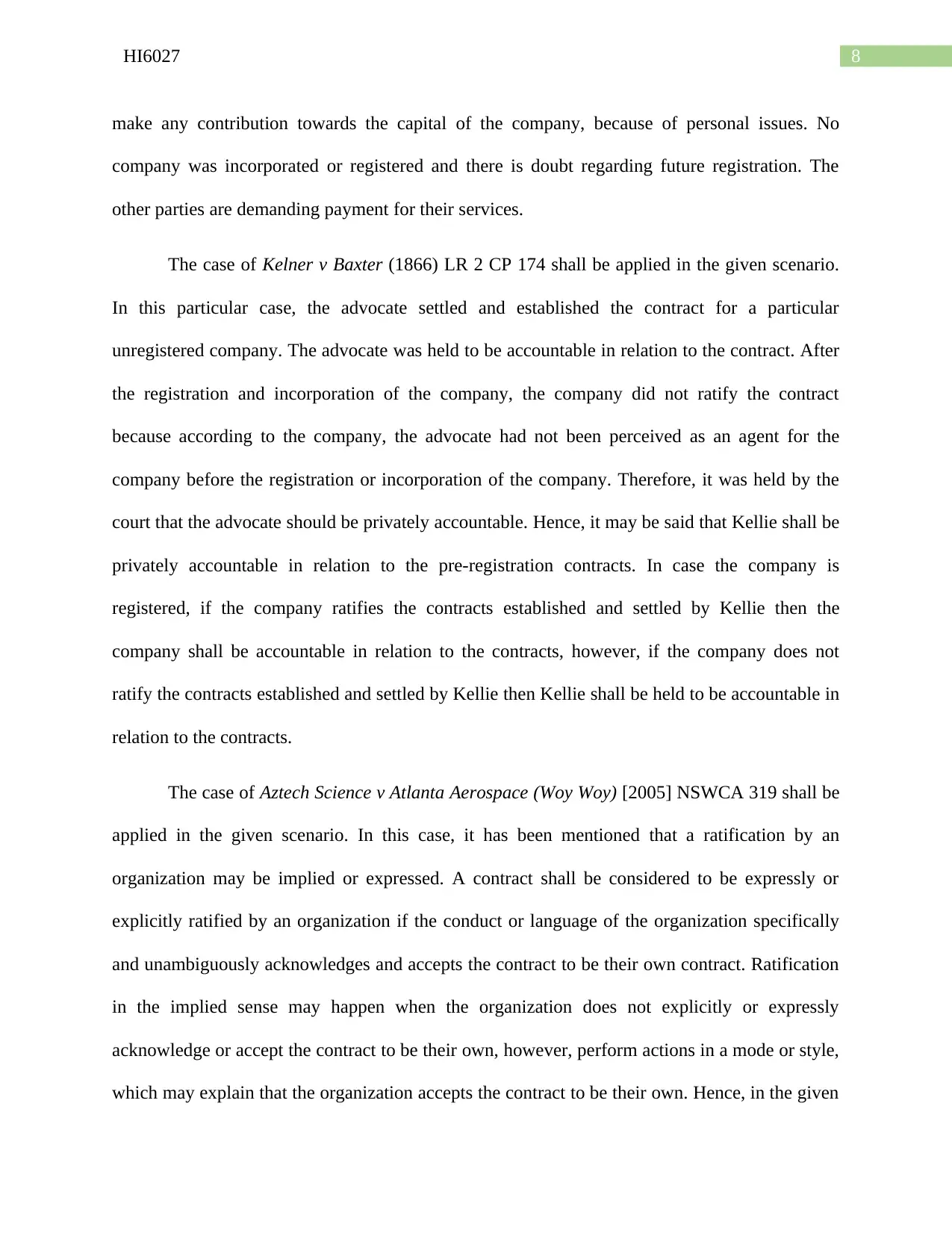
8HI6027
make any contribution towards the capital of the company, because of personal issues. No
company was incorporated or registered and there is doubt regarding future registration. The
other parties are demanding payment for their services.
The case of Kelner v Baxter (1866) LR 2 CP 174 shall be applied in the given scenario.
In this particular case, the advocate settled and established the contract for a particular
unregistered company. The advocate was held to be accountable in relation to the contract. After
the registration and incorporation of the company, the company did not ratify the contract
because according to the company, the advocate had not been perceived as an agent for the
company before the registration or incorporation of the company. Therefore, it was held by the
court that the advocate should be privately accountable. Hence, it may be said that Kellie shall be
privately accountable in relation to the pre-registration contracts. In case the company is
registered, if the company ratifies the contracts established and settled by Kellie then the
company shall be accountable in relation to the contracts, however, if the company does not
ratify the contracts established and settled by Kellie then Kellie shall be held to be accountable in
relation to the contracts.
The case of Aztech Science v Atlanta Aerospace (Woy Woy) [2005] NSWCA 319 shall be
applied in the given scenario. In this case, it has been mentioned that a ratification by an
organization may be implied or expressed. A contract shall be considered to be expressly or
explicitly ratified by an organization if the conduct or language of the organization specifically
and unambiguously acknowledges and accepts the contract to be their own contract. Ratification
in the implied sense may happen when the organization does not explicitly or expressly
acknowledge or accept the contract to be their own, however, perform actions in a mode or style,
which may explain that the organization accepts the contract to be their own. Hence, in the given
make any contribution towards the capital of the company, because of personal issues. No
company was incorporated or registered and there is doubt regarding future registration. The
other parties are demanding payment for their services.
The case of Kelner v Baxter (1866) LR 2 CP 174 shall be applied in the given scenario.
In this particular case, the advocate settled and established the contract for a particular
unregistered company. The advocate was held to be accountable in relation to the contract. After
the registration and incorporation of the company, the company did not ratify the contract
because according to the company, the advocate had not been perceived as an agent for the
company before the registration or incorporation of the company. Therefore, it was held by the
court that the advocate should be privately accountable. Hence, it may be said that Kellie shall be
privately accountable in relation to the pre-registration contracts. In case the company is
registered, if the company ratifies the contracts established and settled by Kellie then the
company shall be accountable in relation to the contracts, however, if the company does not
ratify the contracts established and settled by Kellie then Kellie shall be held to be accountable in
relation to the contracts.
The case of Aztech Science v Atlanta Aerospace (Woy Woy) [2005] NSWCA 319 shall be
applied in the given scenario. In this case, it has been mentioned that a ratification by an
organization may be implied or expressed. A contract shall be considered to be expressly or
explicitly ratified by an organization if the conduct or language of the organization specifically
and unambiguously acknowledges and accepts the contract to be their own contract. Ratification
in the implied sense may happen when the organization does not explicitly or expressly
acknowledge or accept the contract to be their own, however, perform actions in a mode or style,
which may explain that the organization accepts the contract to be their own. Hence, in the given
⊘ This is a preview!⊘
Do you want full access?
Subscribe today to unlock all pages.

Trusted by 1+ million students worldwide
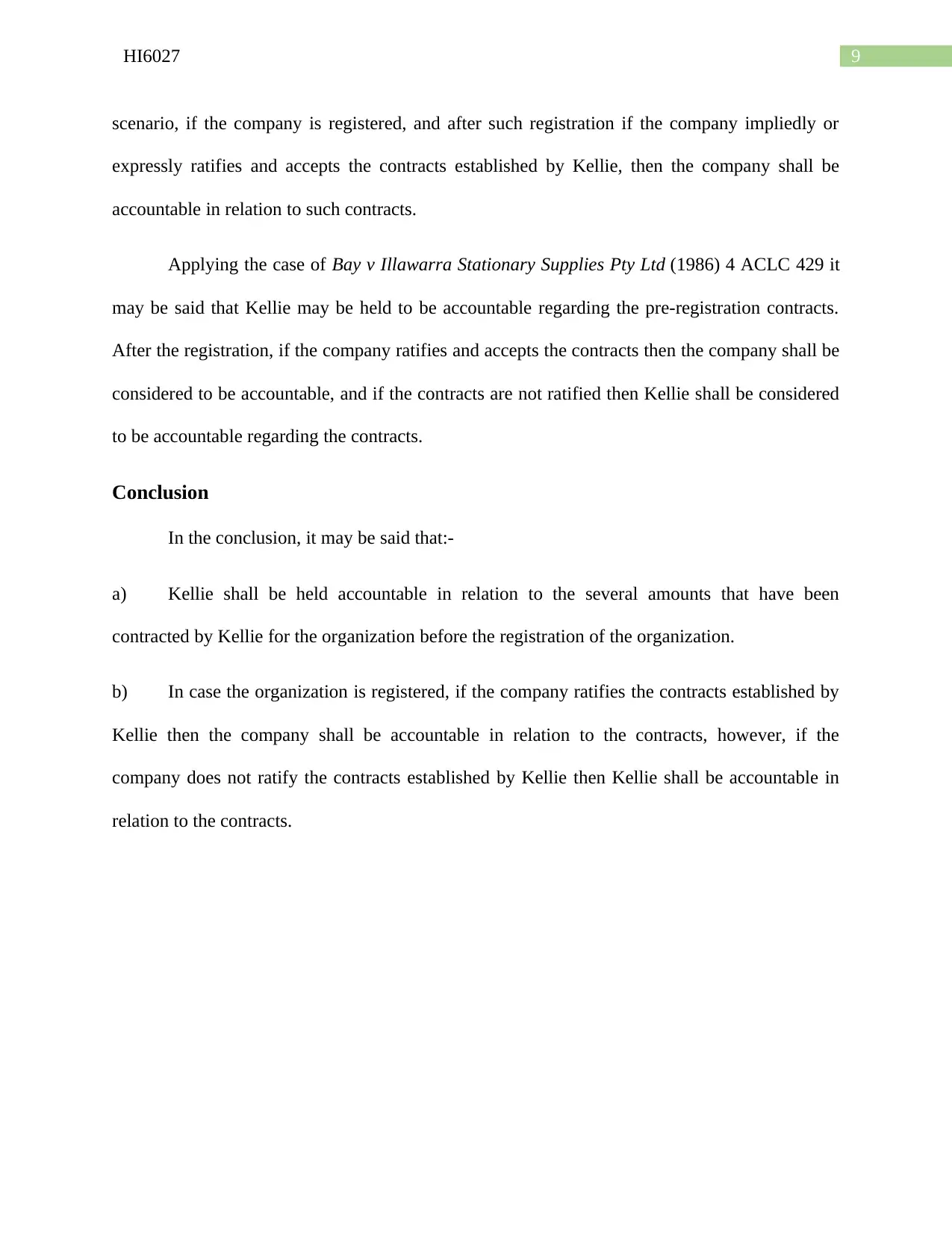
9HI6027
scenario, if the company is registered, and after such registration if the company impliedly or
expressly ratifies and accepts the contracts established by Kellie, then the company shall be
accountable in relation to such contracts.
Applying the case of Bay v Illawarra Stationary Supplies Pty Ltd (1986) 4 ACLC 429 it
may be said that Kellie may be held to be accountable regarding the pre-registration contracts.
After the registration, if the company ratifies and accepts the contracts then the company shall be
considered to be accountable, and if the contracts are not ratified then Kellie shall be considered
to be accountable regarding the contracts.
Conclusion
In the conclusion, it may be said that:-
a) Kellie shall be held accountable in relation to the several amounts that have been
contracted by Kellie for the organization before the registration of the organization.
b) In case the organization is registered, if the company ratifies the contracts established by
Kellie then the company shall be accountable in relation to the contracts, however, if the
company does not ratify the contracts established by Kellie then Kellie shall be accountable in
relation to the contracts.
scenario, if the company is registered, and after such registration if the company impliedly or
expressly ratifies and accepts the contracts established by Kellie, then the company shall be
accountable in relation to such contracts.
Applying the case of Bay v Illawarra Stationary Supplies Pty Ltd (1986) 4 ACLC 429 it
may be said that Kellie may be held to be accountable regarding the pre-registration contracts.
After the registration, if the company ratifies and accepts the contracts then the company shall be
considered to be accountable, and if the contracts are not ratified then Kellie shall be considered
to be accountable regarding the contracts.
Conclusion
In the conclusion, it may be said that:-
a) Kellie shall be held accountable in relation to the several amounts that have been
contracted by Kellie for the organization before the registration of the organization.
b) In case the organization is registered, if the company ratifies the contracts established by
Kellie then the company shall be accountable in relation to the contracts, however, if the
company does not ratify the contracts established by Kellie then Kellie shall be accountable in
relation to the contracts.
Paraphrase This Document
Need a fresh take? Get an instant paraphrase of this document with our AI Paraphraser
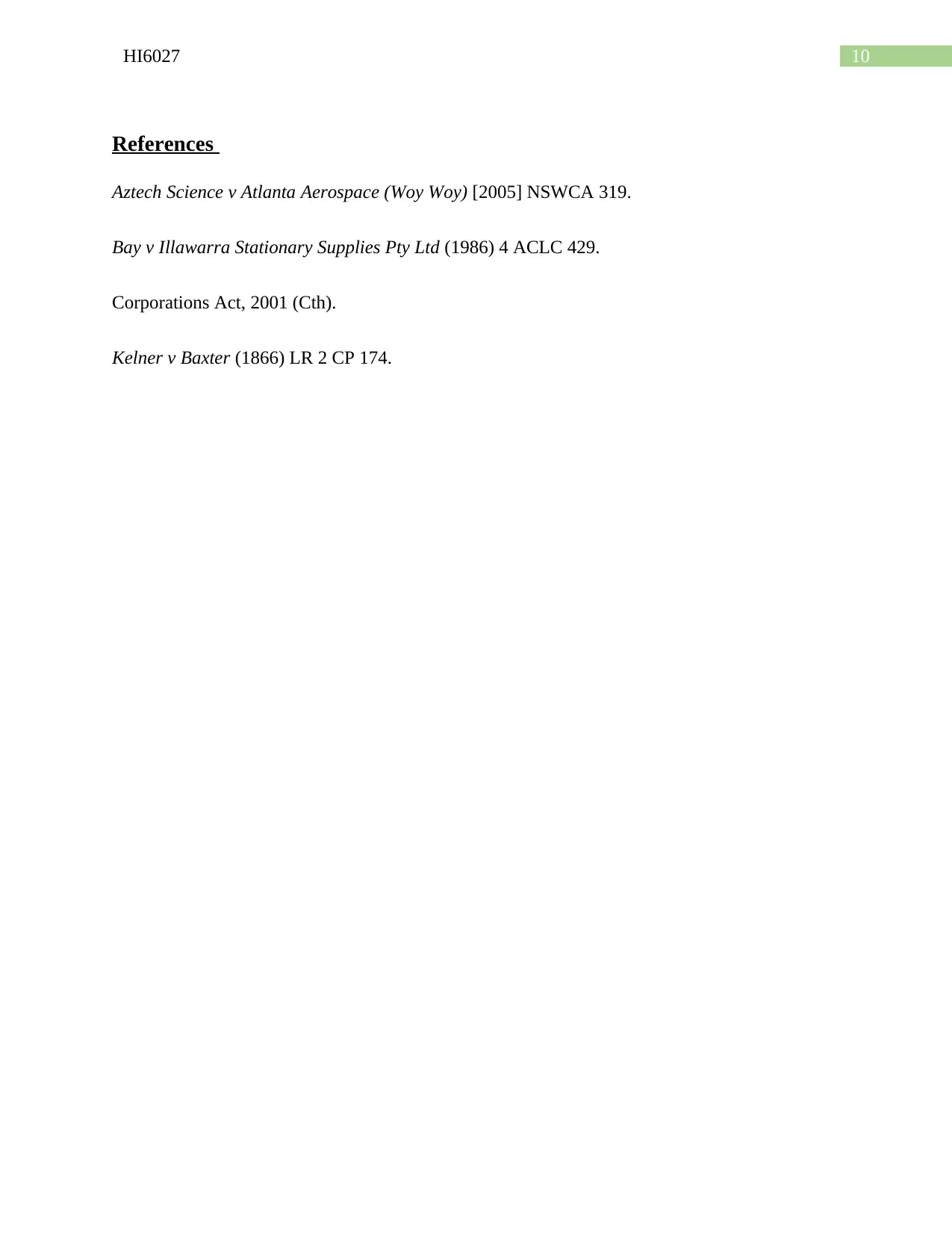
10HI6027
References
Aztech Science v Atlanta Aerospace (Woy Woy) [2005] NSWCA 319.
Bay v Illawarra Stationary Supplies Pty Ltd (1986) 4 ACLC 429.
Corporations Act, 2001 (Cth).
Kelner v Baxter (1866) LR 2 CP 174.
References
Aztech Science v Atlanta Aerospace (Woy Woy) [2005] NSWCA 319.
Bay v Illawarra Stationary Supplies Pty Ltd (1986) 4 ACLC 429.
Corporations Act, 2001 (Cth).
Kelner v Baxter (1866) LR 2 CP 174.
1 out of 11
Related Documents
Your All-in-One AI-Powered Toolkit for Academic Success.
+13062052269
info@desklib.com
Available 24*7 on WhatsApp / Email
![[object Object]](/_next/static/media/star-bottom.7253800d.svg)
Unlock your academic potential
Copyright © 2020–2025 A2Z Services. All Rights Reserved. Developed and managed by ZUCOL.





